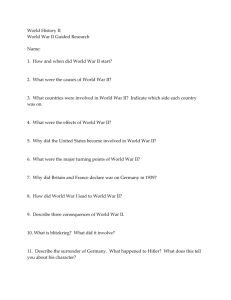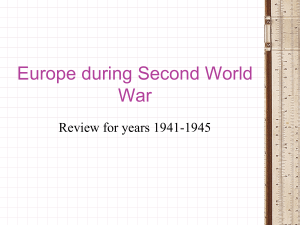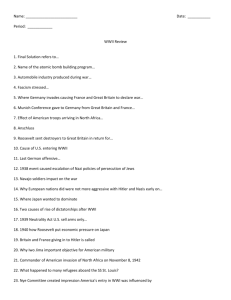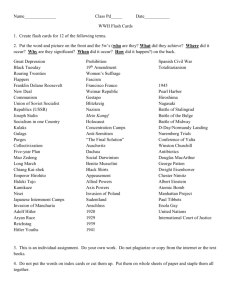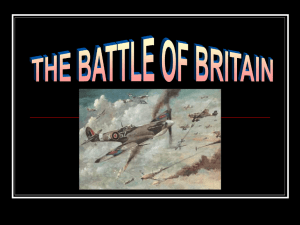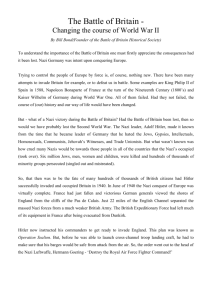Battle of Britain AND Operation Sea Lion
advertisement
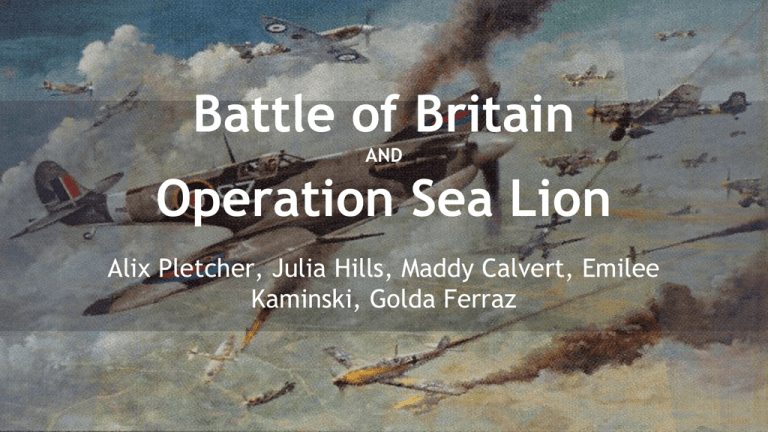
Battle of Britain AND Operation Sea Lion Alix Pletcher, Julia Hills, Maddy Calvert, Emilee Kaminski, Golda Ferraz Thesis The Battle of Britain, a completely air-based conflict, represented the first time the Nazi Empire didn’t easily succeed, damaging German self-esteem. This led Germany to turn away from Britain and target the Soviet Union. Timeline https://prezi.com/jptf9zxu3-rd/edit/ Important Figures ALLIES: ● ● Winston Churchill Hugh Dowding Winston Churchill ○ Prime Minister of England Air Chief Marshal Hugh Dowding ○ Commander in Chief RAF Fighter Command AXIS: ● Adolf Hitler ○ Leader of Germany ● Reichsmarschall Hermann Goering ○ Supreme commander of the German Luftwaffe Churchill honored the pilots of Fighter Command when he said, "Never in the field of human conflict was so much owed by so many to so few." “And for so little” cracked an RAF pilot who felt underpaid” (Moody). Adolf Hitler Hermann Goering WE NEED 6 VOLUNTEERS! The Planes BRITISH: GERMANS: ● Spitfire ● Hurricane ● ● ● ● ● ● Heinkel HeIII Junkers Ju 88A Messerschmitt Bf 109E Dornier Do 17 Junkers Ju 87 "Stuka" Messerschmitt Bf 110 Map Phase One: The Channel Attacks The Luftwaffe begins attacking British convoys (groups of warships) in the English Channel Inflicted massive damage on the warships and the British stop using the Channel for their navy Phase Two: Eagle Attack ● The Luftwaffe attacks RAF airfields in order to gain air supremacy. ● The RAF RADAR warning system coupled with the tight fighter control systems detected the incoming German planes. ● Accidental German attack on London-Hitler responds with full-out bombings in London, resulting in the Blitz. Phase Three: The Blitz ● September 7, 1940: Luftwaffe begin air raids against London. ● September 15: Luftwaffe conducts two massive bombings-ends with 60 German planes shot down and 20 RAF planes. ● Hitler decides to postpone Operation Sea Lion two days later. Phase Three: The Blitz ● After Hitler realized a land invasion of Britain was not going to happen, he shifted his focus to invading the Soviet Union. ● However, Winston Churchill had other ideas... - brought the war to Germany, bombed historical town Dresden Hitler gets mad and decides to bomb, or “blitz” historical towns in England, such as Bath. Phase Four: The End of the Battle ● Hitler realized Germany wouldn’t win the war of attrition with Britain: losses were exceeding British losses. ● October 31, 1940: Battle of Britain ends. The Importance - The first time Nazi Germany didn’t win - The British forced Hitler to cancel Operation Sea Lion - Germany focused on USSR Works Cited Page "Aircraft of the Battle of Britain." Eyewitness to History.com. N.p., n.d. Web. 14 Mar. 2015. Axelrod, Alan. "Battle of Britain." Encyclopedia of World War II, Vol. 1. New York: Facts On File, 2013. Modern World History Online. Web. 13 Mar. 2015. "The Battle of Britain." BBC News. BBC, n.d. Web. 13 Mar. 2015. "Battle of Britain." Battle of Britain. N.p., n.d. Web. 17 Mar. 2015. "Battle of Britain." World History: The Modern Era. ABC-CLIO, 2015. Web. 12 Mar. 2015. Biesinger, Joseph A. "Battle of Britain." Germany. New York: Facts On File, 2006. Modern World History Online. Web. 13 Mar. 2015. "German bombers over burning targets during Battle of Britain." Photos/Illustrations. AP Photo. World History: The Modern Era. ABC-CLIO, 2015. Web. 16 Mar. 2015. "Hermann Goering." Photos/Illustrations. The Illustrated London News Picture Library. World at War: Understanding Conflict and Society. ABC-CLIO, 2015. Web. 16 Mar. 2015. "Hermann Goering." United States Holocaust Memorial Museum. United States Holocaust Memorial Council, 20 June 2014. Web. 15 Mar. 2015. "Leaders and Commanders of the R.A.F. and the Luftwaffe." Leaders and Commanders. Battle of Britain Historical Society, 2007. Web. 13 Mar. 2015. Moody, Sidney C. War in Europe. Novato, CA: Presidio, 1993. Print. Winston Churchill." Bio.com. A&E Networks Television, n.d. Web. 13 Mar. 2015.
